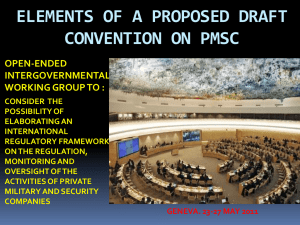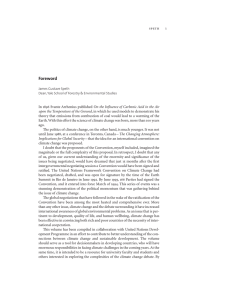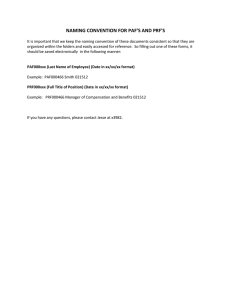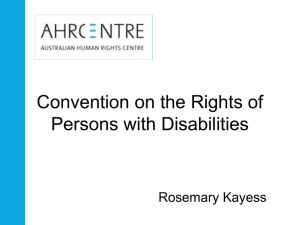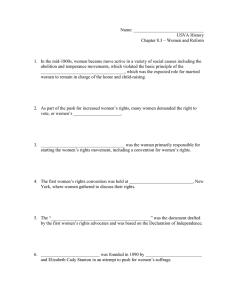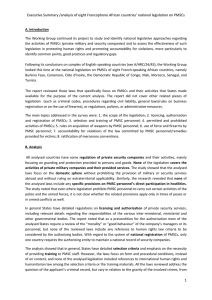CONCEPT NOTE ON A POSSIBLE LEGALLY BINDING INSTRUMENT
advertisement
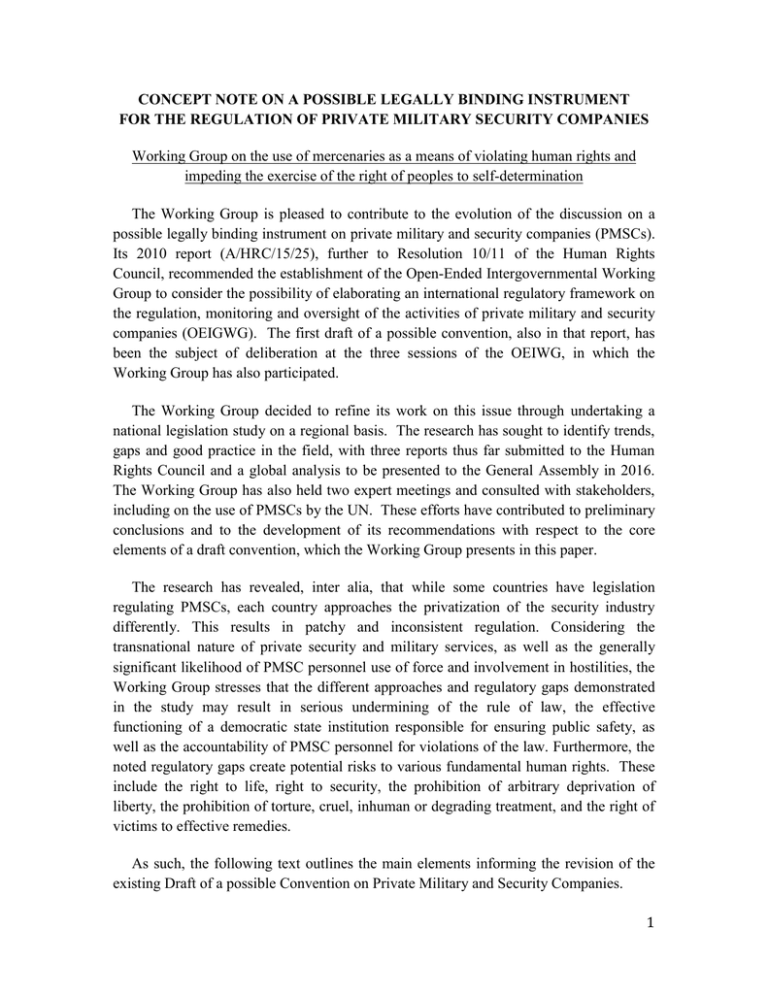
CONCEPT NOTE ON A POSSIBLE LEGALLY BINDING INSTRUMENT FOR THE REGULATION OF PRIVATE MILITARY SECURITY COMPANIES Working Group on the use of mercenaries as a means of violating human rights and impeding the exercise of the right of peoples to self-determination The Working Group is pleased to contribute to the evolution of the discussion on a possible legally binding instrument on private military and security companies (PMSCs). Its 2010 report (A/HRC/15/25), further to Resolution 10/11 of the Human Rights Council, recommended the establishment of the Open-Ended Intergovernmental Working Group to consider the possibility of elaborating an international regulatory framework on the regulation, monitoring and oversight of the activities of private military and security companies (OEIGWG). The first draft of a possible convention, also in that report, has been the subject of deliberation at the three sessions of the OEIWG, in which the Working Group has also participated. The Working Group decided to refine its work on this issue through undertaking a national legislation study on a regional basis. The research has sought to identify trends, gaps and good practice in the field, with three reports thus far submitted to the Human Rights Council and a global analysis to be presented to the General Assembly in 2016. The Working Group has also held two expert meetings and consulted with stakeholders, including on the use of PMSCs by the UN. These efforts have contributed to preliminary conclusions and to the development of its recommendations with respect to the core elements of a draft convention, which the Working Group presents in this paper. The research has revealed, inter alia, that while some countries have legislation regulating PMSCs, each country approaches the privatization of the security industry differently. This results in patchy and inconsistent regulation. Considering the transnational nature of private security and military services, as well as the generally significant likelihood of PMSC personnel use of force and involvement in hostilities, the Working Group stresses that the different approaches and regulatory gaps demonstrated in the study may result in serious undermining of the rule of law, the effective functioning of a democratic state institution responsible for ensuring public safety, as well as the accountability of PMSC personnel for violations of the law. Furthermore, the noted regulatory gaps create potential risks to various fundamental human rights. These include the right to life, right to security, the prohibition of arbitrary deprivation of liberty, the prohibition of torture, cruel, inhuman or degrading treatment, and the right of victims to effective remedies. As such, the following text outlines the main elements informing the revision of the existing Draft of a possible Convention on Private Military and Security Companies. 1 1. The Working Group acknowledges that certain functions are inherent to the State. Functions that are inherent to the State are those for which the State retains ultimate responsibility regardless of whether or not the State outsources that function. The Working Group also believes that some inherent State functions may not be outsourced The Working Group has sought to define in part the nature of inherent functions of the State (Draft Art. 2 (i)). The definition provides for responsibility and accountability by the State for all its inherent functions, regardless of whether these functions are outsourced to other entities or not. It also identifies the two core functions that cannot be outsourced to other entities (Draft Art. 7). These derive from obligations under international humanitarian law, notably the Third Geneva Convention. As such, the following activities cannot be outsourced by States to PMSCs: a) Direct participation in hostilities in armed conflict1; b) Detention and interrogation of prisoners of war, as defined in the Third Geneva Convention. In this latter respect, Article 39 of Convention (III) relative to the Treatment of Prisoners of War, Geneva, 12 August 1949 reads: “Every prisoner of war camp shall be put under the immediate authority of a responsible commissioned officer belonging to the regular armed forces of the Detaining Power.” Similarly, Convention (IV) relative to the Protection of Civilian Persons in Time of War. Geneva, 12 August 1949, in its Article 99 states that “Every place of internment shall be put under the authority of a responsible officer, chosen from the regular military forces or the regular civil administration of the Detaining Power.” 1 Regarding Article 43 of the Protocol Additional to the Geneva Conventions of 12 August 1949, and relating to the Protection of Victims of International Armed Conflicts (Protocol I), 8 June 1977 , one commentary notes that ' the conditions which should all be met to participate directly in hostilities are the following: a) subordination to a "Party to the conflict" which represents a collective entity which is, at least in part, a subject of international law; b) an organization of a military character; c) a responsible command exercising effective control over the members of the organization; d) respect for the rules of international law applicable in armed conflict. These four conditions should be fulfilled effectively and in combination in the field. https://www.icrc.org/applic/ihl/ihl.nsf/Comment.xsp?key=direct%20participation%20in%20hostilities&acti on=openDocument&documentId=0CDB7170225811A0C12563CD00433725 2 Furthermore, the Working Group study has shown significant regulatory gaps as a consequence of vague definitions of the ambit of services, and because so little of the analysed legislation covers private military companies or their military activities. This is especially so considering that PMSCs normally provide various other services besides guarding and patrolling, such as military services, as well as training and advisory services on security matters, and implementation of security measures. Given this observation, the Working Group finds it useful to define in terms of classifications of activity the services it deems necessary to address. These classifications are predicated on identifying which activities increase the risk of human rights violations when undertaken by private actors. Notably, they also fill the gap presented by the Montreux Document, which applies solely to armed conflict. The Working Group thus proposes to include in the draft legislation recommendations for recognition of different classifications of service activity, in terms of the following: 1. Whether the services are: a) military services b) services not of a military character 2. Whether the service providers are: a) armed b) unarmed 3. a) b) c) d) e) f) g) The different scenarios under which services are offered: armed conflicts anti-terrorism activity drug wars border control and immigration detention centres maritime context other context 4. a) b) c) d) e) f) Different types of services: offensive or defensive operations implementation of security measures provision of arms and equipment intelligence, training and advisory services guarding, patrolling and transport other type of services 3 2. Inter-governmental organizations, as well as States, can be Party to the Convention This (Draft Art. 3) links to pre-ambular paragraph 11 on accountability of intergovernmental organizations, and reflects the growing trend of intergovernmental organizations, such as the EU, to assert their objective international legal personality and become Party to international instruments. It is also a reinforcement of the same assertions made in the first draft of the possible convention (A/HRC/15/25). 3. There is one coherent article(Art. 6) on implementation, covering obligations Obligations apply to domestic and international companies, as well as to services offered to states, inter-governmental, non-state or corporate clients. This Article assembles the various implementation related Articles of the first draft convention, in particular its Articles 7 (1), Article 12, Article 13, and Article 19 (4) 4. A license is defined as permission evidenced by a document authorizing specified activities under a law of general application issued by a Stateappointed body authorized to grant such permission A license serves as a modality for establishing and enforcing standards, and a revised definition is offered. 5. There is one coherent article on licensing (Draft Art. 9), encompassing: While some national laws, such as those of Costa Rica and Mexico, make reference to human rights, this is not common practice globally. The Working Group thus asserts that incorporation of clear human rights and humanitarian law standards into contracting, licensing, and authorization procedures should serve as minimum standards in regulation. It must also be the basis for due diligence. This effort further serves to make explicit and legally binding what are now voluntary standards, such as in the International Code of Conduct, the Montreux Document, and the UN Guiding Principles on Business and Human Rights. This Article aims to be comprehensive in the subject and content of licensing regimes, addressing the spectrum of relevant actors and activities potentially impacting on the protection of human rights. It brings together the license related Articles of the first draft possible convention, including its Article 14, Article 15 and Article 19 (3). 4 a) Licensing of companies, including vetting of personnel The Working Group research revealed that, in Europe, with the exception of Switzerland, none of the analysed legislation included international human rights and humanitarian law references in the criteria of authorisation of PMSC activities. The same situation applied to any other related standards regarding the selection process and the training materials. Similarly, Guatemala is the only country in Central America whose regulation excludes the activities of PSCs whose personnel have served in another security company and have been discharged for violation of human rights. In South America, most of the countries examined do not have specific requirements regarding background information on human rights violations. One exception is the Buenos Aires Act prohibiting associates of private security companies who benefited from the law of amnesty - and were indulted for acts constituting human rights violations during the period 1975-1983), who must be accredited with an extended certificate by the competent human rights bodies2. The Working group thus recommends explicit reference to human rights violations and standards in related legislation and regulation.3 b) Licensing the import and export of services c) Licensing the possession of arms The Working Group study demonstrates that in the laws relevant for the activities of PMSCs in Europe, there are no specific provisions on the illegal acquisition of weapons and on illicit trafficking in arms by PMSC personnel, revealing a clear gap of regulation. In order to ensure that PMSC personnel respect the international standards related to arms control licensing procedures, arms transfer, acquisition of weapons, trafficking in arms and that the staff of PMSC can be held accountable for illegal acquisition of weapons and illicit trafficking in arms, it is essential to establish some standard methods of acquiring, 2 Chapter III, Disabilities and incompatibilities. Decree No. 1897/202. 3 Note The Buenos Aires requirements are a good practice to have strict controls on the conduct of the staff of private security companies demanding certification from the authorities, and not making a difference between willful or negligent offenses. Note: Honduras has an exceptional rule, which states that PSCs may not maintain a number of personnel that exceeds 6% of the total workforce police. This requirement is presented as a good practice. 5 exporting, importing, and possessing weapons by private military and security companies and their employees. In Latin America, in the special laws for PSCs, there are no particular provisions regarding the origin of the weapons and their acquisition by PSCs. Only Panama (Decree No. 21) requires that weapons are purchased in the domestic market.4 There are no rules on the acquisition of weapons in national or international illegal markets by PSCs and no specific sanctions on such incidents if they incur within a PSC. This is a common gap in the region in the case of infringements or offenses committed by private security providers, in particular companies.5 d) Licensing the possession of equipment other than arms e.g. vehicles, drones e) Licensing of individuals, with minimum criteria, including training While some countries include human rights in their training programs, such as Brazil, Colombia and Switzerland, incorporation is inconsistent. The Working Group therefore finds it is essential to ensure mandatory legal trainings with references to the relevant international human rights and humanitarian law standards. 4 5 Art. 8 Decree 21/1992. Note Regarding the possession and carrying of weapons, some good practices are: defining in law the highest caliber and type of weapon; requiring training for bodies accredited by the authority, registries of firearms and ammunition with a report on the quantity, type and condition of weapons, updated periodically; regulating the ultimate purpose and use of the weapons in the case of significant downsizing or termination of the company; limiting carrying of arms to the working areas in accordance with the contract; regular inspections of the repositories of guns and ammunition. 6 6. There is an article on registration (Draft Art. 10), as a secondary step following licensing, and serving as a monitoring system With regard to the national registration of PMSCs in Europe, the Working Group study points out that none of the analysed States’ national legislation requires from PMSCs a specific registration other than the general registration in the trade and commerce register.6 The license registry definition (c) and operative paragraphs (Article 16, 2 and 3) in the first draft of the possible convention are thus retained. 7. Regulation of jurisdiction is redefined (Draft Art. 15) In Europe, with the exception of Switzerland, the absence of rules on direct participation in hostilities of PMSC personnel and the lack of extraterritorial application of the concerned laws, as well as the missing provisions on the export of security and military services abroad, further add to the regulatory gaps. This is especially relevant in light of the transnational nature of private security and military services, and the generally high likelihood of PMSC personnel’s use of force and involvement in hostilities. With respect to Latin America, none of the laws address the provision of services abroad, except in one case, and there is no provision on the extraterritorial application of these laws. Given the above analysis, and that the private military and security industry often operates in complex environments characterized by weakened rule of law, accountability may be better ensured through territorial and universal jurisdiction. The extraterritorial provisions in the draft convention are accordingly strengthened, applying the following hierarchy of principles: a) b) c) d) Active person Passive person Territoriality Universal jurisdiction 6 Note Buenos Aires requires that the implementing authority undertake registration of persons authorized to provide private security services6 and also established a register of those disqualified for violations of the Law 12,2976. This last record is good practice … as it would maintain control over those who have committed offenses in the private security system from continuing to provide private security services company despite changing itself or its city of operation, as often happens today. 7 8. A mechanism should be established pursuant to the Convention, for the purposes of oversight and ensuring remedy and reparations for victims - this may be a committee, ombudsperson or other modality In the Working Group study of national legislation in South America, major gaps were observed with regard to accountability concerning the protection of human rights by private security personnel. No crimes are associated with the violation of human rights in the special regulations of the activities of private security companies. None of the laws examined establishes mechanisms for reparations to victims, and only a few make reference to reparations. For Europe, the analysis indicates that the relevant legislation lacks specific rules on the content of monitoring activities and inspections. The legislation also does not make reference to the company’s or its personnel’s compliance with the standards of international human rights law and humanitarian law, and to effective remedies to victims. In light of this, the Working Group proposes to establish a framework for oversight, and for reparation and remedy for victims (Draft Art. 13 on” Judicially enforceable remedies for victims”). Such a framework is also in keeping with the “Protect, Respect, Remedy” approach of the UN Guiding Principles on Business and Human Rights. Part V of the first possible draft convention (Articles 29 to 39) is thus retained. Much of the rest of the original draft convention is also retained, including all but one of the pre-ambular paragraphs, Articles 5 and 11, and all of Part VI (Articles 40 to 49). Conclusion The Working Group trusts that these proposed revisions constitute a current, focused, streamlined, and realistic option for consideration as the OEIGWG proceeds with its deliberations. 8
